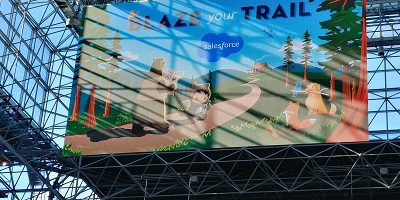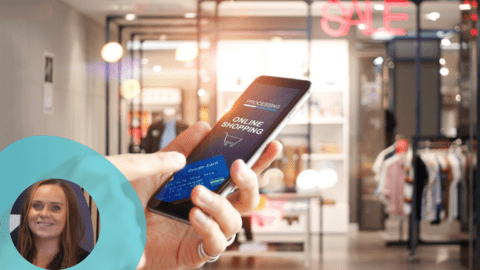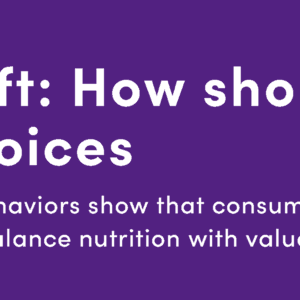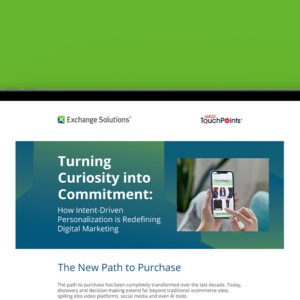Salesforce took its Dreamforce event on the road, landing at New York City’s Javits Center Dec. 14. The keynotes, presentations and breakout sessions covered a wide range of solutions and success stories, but the overriding theme for retailers was the importance of applying personalization at every stage of the shopper journey.
Some of the event’s highlights included:
• How Adidas marketers are leveraging the Salesforce Einstein AI solution to orchestrate personalized consumer journeys across multiple digital devices; and
• How UGG shoes are simplifying mobile searches with machine learning-based product recommendations.
Advertisement
In other announcements during the event:
- Ashley Furniture has selected Salesforce Commerce Cloud and Service Cloud solutions to unify customer experiences across all points of commerce, from shopping to fulfillment to customer service; and
- Salesforce has launched Distributed Marketing, a product that enables corporate marketers to deliver approved, on-brand customer journeys to large partner networks, such as franchisees, financial advisors and resellers.
Adidas Runs Further With AI
The Adidas.com site has become the sneaker retailer’s number-one store, achieving 66% year-over-year growth, and the ability to deliver personalized experiences to shoppers is a major reason for its success. Stephanie Buscemi, EVP Product Marketing at Salesforce, identified the roles that Salesforce solutions have played.
The Salesforce Marketing Cloud can now gather detailed data from social networks, allowing Adidas to track not just product and company mentions by name but also product pictures and logos. “The Salesforce Data Management Platform (DMP) can capture, unify and activate this customer data, including web behaviors, at scale, and then deliver personalized ads at scale,” said Buscemi.
Einstein segmentation that is built into the DMP allows Adidas marketers to do lookalike modeling, “uncovering new target audience segments that would otherwise have been unknown to them,” Buscemi added.
The retailer uses Salesforce Commerce Cloud to build its online site once and deploy it globally. “It can operate in multiple languages and currencies, to be relevant in the markets a retailer serves,” said Buscemi. The Einstein Predictive Sort capability that is built in allows these sites to “surface only the things that are most relevant to individual shoppers, based on their online behaviors and interests,” said Buscemi.
Einstein also powers bots that Adidas uses for post-purchase outreach to customers. The Adibot can initiate a text conversation with a consumer after she has bought a pair of sneakers: “It has access to all the customer information, so she can make any kind of change, whether that’s the shipping address or the color of the shoes,” explained Buscemi. “The more Einstein interacts with consumers and their data, the smarter it gets,” she noted.
UGG Streamlines Mobile Shopping
Like Adidas, UGG has made extensive use of the AI and machine learning capabilities of Salesforce Commerce Cloud to simplify its mobile customer experience. For example, Einstein-powered product recommendations allow UGG to personalize product list pages that are presented to shoppers. A new Einstein Search Dictionaries feature makes it easier for the retailer’s merchandising teams to map back to specific product attributes.
On the show floor at the New York City Dreamforce event, Salesforce presented recommendations for creating an effective mobile-first experience. The tips are based on a macro view across the 2,700 sites operating on the Commerce Cloud platform:
• Simplify: 54% of mobile sites suffer from over-categorization, so make product detail expandable and collapsible so it doesn’t clog up the small screen space;
• Make buttons big enough for easy use: Salesforce recommends that buttons be 44 by 44 pixels wide, approximately the size of a human finger;
• Prioritize search capabilities: Consumers using search convert at 3X the rate of those using site navigation tools; and
• Make it easy to check out at any point in the process: Make the “add to cart” button persistent throughout the mobile shopping process.
Ashley Furniture Seeks To Connect Customer Experiences
Ashley Furniture, which supplies home furnishings to more than 6,000 retail partners in 123 countries and operates 750+ retail locations, will use Salesforce Commerce Cloud to deliver more personalized shopping journeys across web, mobile, social or in-store touch points. Ashley customers will get unique content, campaigns, offers and recommendations based on data such as their browsing history and past purchases.
Additionally, Salesforce Service Cloud will provide Ashley customer service agents with an omnichannel view of each customer, allowing them to pick up conversations with shoppers wherever their last interaction with the brand left off. Ashley also plans to leverage the Salesforce Platform to build an in-store clienteling app for its salespeople.
“Innovation and the desire to continuously improve have been at the foundation of Ashley’s success for more than 70 years,” said Chris Wantlin, CIO and Chief Digital Officer at Ashley Furniture in a statement. “That’s why we’re undergoing a complete digital transformation with Salesforce. We’re moving to one unified platform for customer engagement to ensure every customer has an exceptional experience with our brand.”
Distributed Marketing Solution Debuts
Salesforce spotlighted the recently introduced Distributed Marketing solution, which allows marketers at the corporate HQ to pre-build personalized customer journeys using Salesforce Marketing Cloud and then deploy them to partner networks. Partners using Salesforce Sales Cloud, Service Cloud or Community Cloud can manage and personalize these journeys, which can include onboarding new clients, holiday promotions or renewals.
Benefits of Distributed Marketing include:
• Ensuring compliance with corporate marketing brand standards;
• Empowering partners to be more effective digital marketers with pre-built marketing journeys; and
• Understanding journey engagement with deep analytics, both at the partner level and in aggregate at the corporate level.
Planet Fitness uses Salesforce Distributed Marketing to improve how it manages partnerships with franchise owners, including streamlining critical processes such as opening new stores. Planet Fitness has increased franchisee engagement by nearly 200%; boosted email engagement with 1.9 million emails sent to members per month; and has handled 300,000 social customer service cases during the past six months, according to Salesforce.
“We’re excited about Distributed Marketing from Salesforce because it’s the next step for companies like ours to empower franchise owners to communicate with their members through curated marketing journeys and on-brand content,” said Chris Lavoie, VP of Information Systems at Planet Fitness in a statement. “This kind of solution will have a big impact on driving Planet Fitness memberships and member engagement.”
Distributed Marketing is available as a component in Sales Cloud, Service Cloud or Community Cloud in limited pilot today, and is expected to be generally available by February 2018.















